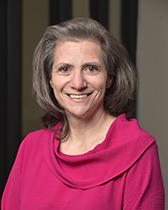Vicky Kalogera
Daniel I. Linzer Distinguished University Professor/ Director of CIERA/Director of NSF-Simons AI Institute for the Sky

- vicky@northwestern.edu
- Website
- 847-491-5669
- 1800 Sherman #8071
Vicky Kalogera’s research interests lie broadly in the astrophysics of compact objects across the electromagnetic spectrum and in gravitational waves. In binary systems, where two stars orbit each other, the interactions of compact objects are especially interesting. They can include a wide variety of violent phenomena such as powerful X-ray emissions, supernova explosions, black hole formation, and mergers.Kalogera's research is focused mainly on how such systems are born, how they evolve, and how they end their lives. She is also interested in how the properties of such systems are affected by their galactic environments.
Kalogera is a leading astrophysicist in the LIGO Scientific Collaboration (LSC) and a member of this collaboration for more than 15 years. LIGO (Laser Interferometer Gravitational-wave Observatory) is the special kind of ‘telescope’ that first detected gravitational waves in 2015, 100 years after Einstein predicted them to exist. As a member of the discovery team of the first LIGO source (GW150914), she was awarded the 2016 Gruber Prize in Cosmology and the 2015 Special Breakthrough Prize in Fundamental Physics.
Kalogera is at the forefront of the emergent field of gravitational-wave astronomy, using data analysis and astrophysical modeling to understand the universe’s population of black holes and neutron stars. Her research is cross-disciplinary coupling gravitational-wave and stellar astrophysics to data science, machine learning and high-performance computing. In parallel to her gravitational-wave source studies, Kalogera also studies the formation and evolution of stars and their remnants detectable as gamma-ray, X-ray, and radio pulsar sources in the electromagnetic spectrum, in a wide range of stellar environments.
Research interests
- Astrophysics of Compact Objects (Black Holes, Neutron Stars, and White Dwarfs) across the Electromagnetic and Gravitational Wave Spectrum
- Formation and Evolution of Binary Systems with Compact Objects in varied galactic environments Time-Domain Transient and Multi-Messenger Astrophysics
- Machine Learning in Astrophysical Data Analysis and Modeling
Honors and Awards
- American Academy of Arts and Sciences, Elected Fellow (2021)
- Guggenheim Fellowship (2021)
- American Astronomical Society, Legacy Fellow (2020)
- American Association for the Advancement of Science, Elected Fellow (2019)
- National Academy of Sciences, Elected Member (2018)
- Dannie Heineman Prize for Astrophysics, American Institute of Physics (AIP) and the American Astronomical Society (AAS) (2018)
- Hans A. Bethe Prize, American Physical Society (2016)
- Simons Foundation Fellow in Theoretical Physics (2012)
- American Physical Society, Fellow (2009)
With the LIGO Collaboration (selected):
- Special Breakthrough Prize in Fundamental Physics (2016)
- Bruno Rossi Prize, American Astronomical Society (2017)
Selected Publications
“One Channel to Rule Them All? Constraining the Origins of Binary Black Holes Using Multiple Formation Pathways”, Zevin, M., Bavera, S.S., Berry, C.P.L., Kalogera, V. Fragos, T., Marchant, P., Rodriguez, C.L., Antonini, F., Holz, D.E., Pankow, C. 2021, The Astrophysical Journal, Volume 910, Issue 2, id.152, 18 pp.
“A Black Hole Kicked at Birth: MAXI J1305-704”, Kimball, C., Imperato, S., Kalogera, V., Rocha, K.A., Doctor, Z., Andrews, J.J., Dotter, A., Zapartas, E., Bavera, S.S., Kovlakas, K., Fragos, T., Srivastava, P.M., Misra, D., Sun, M., Xing, Z. 2023, The Astrophysical Journal Letters, Volume 952, Issue 2, id.L34, 7 pp.
“Population of Merging Compact Binaries Inferred Using Gravitational Waves through GWTC-3”, Abbott, R., et al. 2023, Physical Review X, Volume 13, Issue 1, article id.011048.
“POSYDON: A General-purpose Population Synthesis Code with Detailed Binary-evolution Simulations”, Fragos, T., et al. 2023, The Astrophysical Journal Supplement Series, Volume 264, Issue 2, id.45, 46 pp.
“Evolutionary Origins of Binary Neutron Star Mergers: Effects of Common Envelope Efficiency and Metallicity”, Gallegos-Garcia, M., Berry, C. P. L., Kalogera, V. 2023, The Astrophysical Journal, Volume 955, Issue 2, id.133, 8pp.
“Gravity Spy: Lessons Learned and a Path Forward”, Zevin, M., et al. 2024. The European Physical Journal Plus, Volume 139, Issue 1, article id.100.
“To Be or not to Be: the role of rotation in modeling Galactic Be X-ray Binaries”, Rocha, K. A., Kalogera, V., Doctor, Z., Andrews, J. J., Sun, M., Gossage, S., Bavera, S. S., Fragos, T., Kovlakas, K., Kruckow, M. U., Misra, D., Srivastava, P. M., Xing, Z., Zapartas, E., 2024, The Astrophysical Journal, Volume 971, Issue 2, id.133, 15pp.
